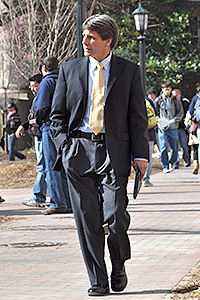Walking the Brick Pathways
New Dean Does Field Research on Graduate Education

Dean of the Graduate School, Steve Matson
In his first months as the new Dean of the Graduate School, Steve Matson made good use of the skills he used for years in his laboratory in Fordham Hall. Matson applied the same techniques he used researching DNA structure to improving graduate education at the University of North Carolina at Chapel Hill. It is an approach anchored in the building blocks of scientific inquiry: detailed observation and methodical analysis.
It also involved a lot of walking.
Matson, a Professor and former Chair of the Department of Biology, began his tenure at the Graduate School with an ambitious goal: to visit every academic department that had a graduate program. The mission took the new Dean from his office in Bynum Hall to points all across campus, sometimes traversing the campus several times in one day to attend meetings in different departments.
For Matson, the meetings were not only a way to introduce himself as the new Dean but more importantly, they were a way to closely observe and collect data on the overall health of graduate education at Carolina.
“The visits allowed me to see firsthand how each department functions and excels in the area of graduate education,” Matson says. “I asked questions about each department’s admissions process, the quality of students admitted and how students were supported once they were enrolled.”
It was a time-intensive process that took several months to complete, but in the end Matson had thoroughly immersed himself in all aspects of graduate education at Carolina.
“We need to educate the leaders in the community and the state. I do not think a lot of people fully appreciate how important graduate programs are to the state of North Carolina.”
He was surprised by what he learned.
“The University of North Carolina at Chapel Hill is a research institution and for that reason many people tend to focus on the research degrees we offer,” Matson says. “But there are a number of other interesting degrees that are not research focused and that are important for our mission within the state of North Carolina.”
Matson was impressed with the wide range of certificate programs offered within the University. He believes these programs are an important part of the University’s outreach to the state.
“Certificate programs in the School of Public Health and the School of Social Work are being used to train public health workers and social workers in North Carolina,” Matson says. “These certificate programs are attractive to individuals who are out there working and want to increase their knowledge. It extends their knowledge and it extends the service they can provide to the state.”
The departmental meetings have reinforced Matson’s belief that graduate education at the University has an important but often underappreciated impact in North Carolina. He wants to change those perceptions.
“One of my main goals as Dean of the Graduate School is to educate the state at large with regard to who graduate students are, what it is they do and what they provide,” Matson says. “We need to educate the leaders in the community and the state. I do not think a lot of people fully appreciate how important graduate programs are to the state of North Carolina for producing the next generation of professors, for producing leaders in all disciplines and for providing the knowledge the state continually needs to sustain its economic and financial wellbeing.”
Matson’s thorough approach and keen attention to detail have impressed many of his colleagues. Steven Reznick, a Professor in the Department of Psychology and Associate Dean for First-Year Seminars and Academic Experiences, admires Matson’s dedication to graduate education and his vision for the Graduate School.
“Dean Matson’s strategy of meeting with department chairs and leaders demonstrates his savvy understanding of what it will take to be effective and successful in his new position,” Reznick says. “During our meeting, his enthusiasm for graduate education was infectious, his understanding of the relevant issues was impressive and his leadership skills were obvious. I feel confident he will keep graduate education at Carolina on the impressive trajectory established by his predecessors but also will embrace innovations aimed at making graduate education at Carolina even better.”
• J. Todd Brantley


